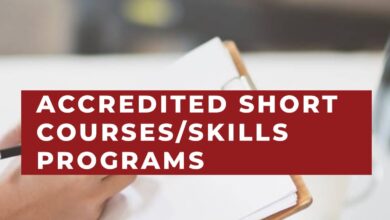INSETA Claims Handling Qualification

INSETA Claims Handling Qualifications: Your Way to a Good Career
The insurance world helps people feel safe and secure. Inside this big industry, claims handling is super important. It makes sure people get help when bad things happen. If you want a job in this key area, you need to know about the training and how to apply. INSETA, which stands for the Insurance Sector Education and Training Authority, is key here. They help set up and guide people with the right skills. This article talks all about INSETA claims handling qualifications. It will tell you what they are and how you can start this rewarding job path.
Finding your way in insurance can seem tricky. This is true for special jobs like claims handling. But with the right papers, you can do well. INSETA qualifications teach you about insurance rules, laws, and how to manage claims from start to finish. If you are new or want to get better at your job, learning about these papers is your first step. It leads to a steady and important profession.
This guide will make INSETA claims handling qualifications clear. It will also show you the application steps. We will look at different training levels. You will see what skills you learn and what you need to do to apply for these good programs. When you finish reading this, you will have a clear plan to reach your career goals in INSETA-approved claims handling.
Understanding INSETA and Its Role in Claims Handling
What is INSETA?
INSETA is the main group for learning and training in South Africa’s insurance world. Think of it as the guide that makes sure everyone gets good training. It sets the bar for skills needed in the industry. INSETA ensures that training programs meet high standards.
The Importance of Accredited Qualifications
Why are INSETA-approved papers so important for claims handling jobs? They give you trust and respect in the insurance field. Employers know that if you have an INSETA qualification, you know your stuff. This helps you get hired and move up.
These qualifications mean you have the right skills to do the job well. They show you can handle claims fairly and correctly. For you, it means a better job outlook. For the industry, it means better service for everyone.
Overview of INSETA’s Role for Claims Handling
INSETA really focuses on training people for claims jobs. They make sure the courses teach what companies actually need. This focus helps create skilled claims handlers. It gets them ready for real work situations.
INSETA Qualifications for Claims Handling
National Certificate: Claims Management
This is often where people begin their journey. The National Certificate in Claims Management gives you the basics you need. It helps you understand how claims work from start to end. This paper is good for those just getting into the claims department.
- Key Learning Areas:
- You learn the main ideas of insurance.
- You study the laws around claims.
- You find out how to look into a claim.
- You practice how to figure out what a claim is worth.
- You learn how to settle a claim with the customer.
- Target Audience and Prerequisites:
- This certificate is best for people starting out in claims. Maybe you are fresh out of school. Or you just want to switch to an insurance job.
- You usually need a Grade 12 (matric) certificate. Some places might look for basic office skills.
- Career Opportunities:
- After getting this, you could work as a Junior Claims Handler.
- Roles like Claims Administrator or Claims Assessor Assistant are also common. You help with paperwork and initial checks.
Further Education and Training Certificate (FETC): Claims Administration
This qualification builds on what you learn in the first certificate. It helps you gain more advanced skills. You handle tougher claim situations. This FETC gets you ready for more complex duties.
- Advanced Claims Processes:
- You learn about tricky claim types.
- You study how to spot and stop fraud.
- You get better at talking things through and making deals.
- Legal and Ethical Considerations:
- You dive deeper into rules and laws that govern claims.
- You understand what is right and wrong when dealing with customers.
- You learn how to solve arguments fairly.
- Soft Skills for Claims Professionals:
- Good talking skills are key here.
- You learn how to give great customer service.
- You become better at solving problems quickly. These skills are vital when people are having a tough time.
Professional Qualifications: Advanced Claims Management and Specializations
For those who want to move up or focus on a certain area, there are advanced choices. These might include special diplomas. Or they could be training for specific types of insurance claims. These papers push your skills even further.
- Specialized Claims Handling (e.g., Short-Term, Long-Term):
- You can focus on areas like motor claims, for cars and bikes.
- Or property claims, for homes and buildings.
- Life insurance claims are also a big part of this, dealing with very personal matters. Each area needs its own set of skills.
- Claims Leadership and Management:
- Some qualifications teach you how to lead a team.
- You learn to manage a whole claims department.
- This includes planning for the future and making things run smoother.
- Continuing Professional Development (CPD) Opportunities:
- Learning never stops in this field. It’s smart to keep your skills sharp.
- INSETA backs programs that help claims pros keep growing. These often called CPD programs.
The Application Process for INSETA Qualifications
Identifying Accredited Training Providers
Finding a good school or college is the first step. You want a place that INSETA trusts. This means their training is up to par. Don’t waste your time or money on places that aren’t approved.
- How to Verify Accreditation:
- Go to INSETA’s official website. They have a list of all approved training places.
- If you’re not sure, you can call INSETA directly. They can tell you if a provider is real.
- Choosing the Right Provider for You:
- Think about where the school is located. Is it easy for you to get there?
- Do they offer online classes, or only in-person? Pick what works best for your life.
- Check out the course fees. Compare prices between different places.
- Look up what other students say about the provider. A good reputation matters.
Understanding Application Requirements
Every training program has rules about who can apply. Knowing these helps you get your application right the first time. It saves you stress later on.
- Required Documentation:
- You’ll need a certified copy of your ID document.
- Have certified copies of your school certificates ready.
- Prepare a good CV, listing your work history.
- Write a letter explaining why you want to join.
- Eligibility Criteria:
- Most programs need you to have finished Grade 12.
- There might be age rules, but these are rare.
- Any job experience, even if it’s not in insurance, can help. Especially if it involves talking to people.
- Application Deadlines and Cycles:
- Programs often have certain times when you can apply. These are called cycles.
- Make sure you know when applications open and when they close. Don’t miss the date.
Tips for a Successful Application
Want to stand out? A strong application can make a big difference. It shows you are serious about a career in claims.
- Crafting a Strong Motivation Letter:
- Tell them why claims handling excites you.
- Explain why you are a good fit for their program.
- Be honest and show your passion. Make it personal.
- Highlighting Relevant Experience (Even Unpaid):
- Did you work in retail and help customers? That’s good customer service experience.
- Did you handle money or paperwork? Those are admin skills.
- Any role where you solved problems or talked to people can count.
- Preparing for Potential Interviews or Assessments:
- Some programs might ask you to come for an interview.
- They might also give you a test. This checks your skills.
- Be ready to talk about why you want the job and what you know about claims.
Benefits of INSETA Claims Handling Qualifications
Enhanced Employability and Career Advancement
Having an INSETA qualification gives you a real edge in the job market. It opens many doors for your future in insurance. Your skills are formally recognized.
- Industry Recognition and Credibility:
- Employers in insurance know and trust INSETA papers.
- This means you are seen as a serious and capable person.
- It adds weight to your CV.
- Access to Higher-Level Positions:
- With these papers, you can aim for better jobs.
- You can move up to senior roles in claims departments.
- Many people with these qualifications get promoted quickly.
Development of Essential Skills and Knowledge
The training shapes you into a smart and effective claims professional. You learn practical things you will use daily. Plus, you get a deep grasp of industry rules.
- Practical Claims Management Skills:
- You learn to read insurance policies and understand them.
- You master how to investigate claims properly.
- You become good at negotiating with people, which is vital.
- Understanding of Insurance Law and Ethics:
- You gain key knowledge about insurance laws.
- You also learn to act in a fair and honest way. This is very important when handling claims.
Contribution to the Insurance Sector
Qualified claims handlers do more than just their job. They help the entire insurance world work better. They make sure the system is fair for everyone.
- Ensuring Fair and Efficient Claims Settlement:
- Skilled people help claims get settled smoothly.
- This makes customers happy and keeps the industry running well.
- Combating Fraud and Improving Risk Management:
- Trained staff can spot fake claims better. This saves money for insurers.
- It also makes the whole system more stable and trustworthy.
Real-World Impact and Future Outlook
Success Stories and Industry Demand
Many people have built great careers because of INSETA qualifications. The need for good claims handlers is always there. Companies always need sharp minds to manage claims.
- Testimonials or Case Studies:
- Think about people like Sarah, who started as a junior claims handler. After getting her INSETA certificate, she quickly moved up to a team leader role.
- Or John, who used his advanced INSETA training to specialize in complex commercial claims. He now runs his own unit.
- Current Job Market Trends for Claims Handlers:
- The demand for skilled claims pros stays strong.
- Insurance companies always look for people who know how to handle claims well. This job often has steady growth.
Evolving Landscape of Claims Handling
The way claims are handled is changing. New tools and ways of working mean new skills are needed. Staying updated is crucial.
- Impact of Technology (e.g., AI, Automation):
- New tech like AI helps process claims faster.
- Automated systems are handling simple tasks. This means human claims handlers focus on harder cases.
- You will need to understand how to work with these new tools.
- The Importance of Adaptability and Upskilling:
- The industry keeps moving. So must you.
- Keep learning new things to stay current. This helps you stay a valuable part of the team.
Conclusion: Your Next Steps to a Claims Handling Career
A career in claims handling is a vital and rewarding choice. INSETA qualifications are your solid path to success. They give you the knowledge, skills, and industry recognition you need. From the first certificate to advanced specializations, each step prepares you for a bright future. You learn how to help people, deal with tough situations, and uphold fairness.
Now is the time to take action. Research INSETA-accredited training providers. Look at their programs and find one that fits your goals. Get your documents ready and write that strong application letter. Remember, every major step begins with a first move. Your journey to becoming a skilled claims handler starts now. Dive in and build a career that truly makes a difference.





